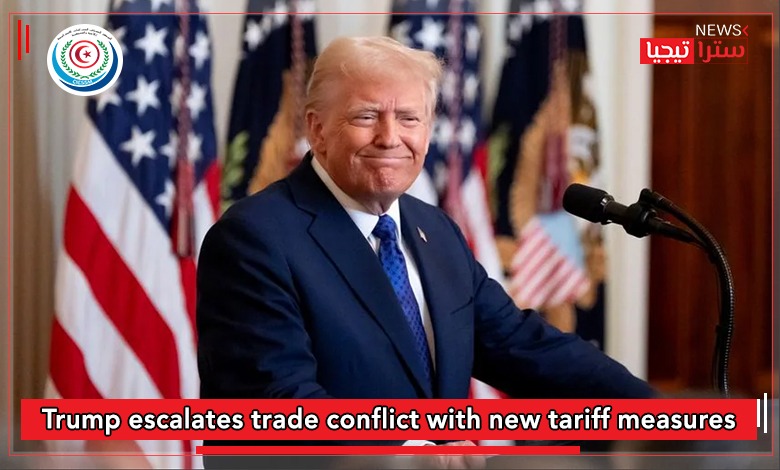Department of Research, Studies and International News 10-02-2025
In a significant move that is expected to heighten global trade tensions, former U.S. President Donald Trump has announced a fresh wave of tariffs targeting steel and aluminum imports. Alongside these measures, he has also pledged to impose reciprocal tariffs on countries that implement trade duties against American goods.
A Bold Announcement and Retaliatory Strategy

Speaking to reporters aboard Air Force One, Trump declared that he would formally unveil a 25 percent tariff on all steel and aluminum imports the following day. Additionally, he noted that later in the week, he would announce countermeasures against specific countries that impose levies on U.S. exports. However, the president did not specify which nations would be affected by these retaliatory tariffs, emphasizing instead that the U.S. would simply be matching the duties imposed by its trading partners.
“Very simply, it’s if they charge us, we charge them,” Trump stated. “If they are charging us 130 percent and we’re charging them nothing, it’s not going to stay that way.”
Key Suppliers at Risk
The United States relies heavily on imports of steel and aluminum from several countries. According to data from the U.S. government and the American Iron and Steel Institute, Canada is the largest steel supplier to the U.S., followed by Brazil, Mexico, South Korea, and Vietnam. Similarly, Canada is the primary exporter of aluminum to the U.S., with China, Mexico, and the United Arab Emirates among the top suppliers.
Canada, in particular, has voiced concern over the potential economic impact of these tariffs. François-Philippe Champagne, Canada’s Minister of Innovation, took to social media to highlight the crucial role Canadian steel and aluminum play in supporting American industries such as defense, shipbuilding, and automotive manufacturing. “This is making North America more competitive and secure,” Champagne stated. “We will continue to stand up for Canada, our workers, and our industries.”
International Reactions and Australia’s Response
Australia has also responded to the U.S. president’s latest tariff threats. Prime Minister Anthony Albanese confirmed that he was scheduled to discuss the matter directly with Trump, expressing his intent to advocate for Australia’s interests.
“We will continue to make the case for Australia’s national interest with the U.S. administration,” Albanese told the Australian Parliament. He also pointed out that tariffs do not solely affect exporters but also increase costs for American consumers and businesses that purchase Australian products.
Australia’s steel and aluminum exports to the U.S. are valued at hundreds of millions of dollars. In 2023, the country exported approximately $237 million worth of steel and iron to the United States, followed by $275 million in aluminum shipments the following year, according to United Nations trade data.
Escalating Trade Tensions with China, Mexico, and the EU
Trump’s latest round of tariff threats follows his recent proposal to impose a 25 percent duty on all goods imported from Canada and Mexico, as well as a 10 percent tariff on Chinese imports. However, in a last-minute shift, the U.S. president agreed to delay the tariffs on Canada and Mexico after both nations pledged to take stronger measures to combat illegal drug trafficking and curb undocumented migration across the U.S.-Mexico border.
Meanwhile, China, which has been a primary target of Trump’s trade policies, has already implemented retaliatory tariffs on American exports. These countermeasures took effect on Tuesday, further intensifying the ongoing trade dispute between the two economic giants.
Trump has also hinted that the European Union could be the next target of his tariff policies. Earlier this month, he accused the EU of unfair trade practices, claiming that the bloc imports “almost nothing” from the United States while the U.S. takes in “everything” from Europe.
“The EU is really out of line. It is an atrocity, what they have done,” Trump stated on February 2. While he did not provide a specific timeline, he warned that tariffs on European imports could be introduced “very soon.”
Trump’s remarks have triggered mixed reactions in global financial markets. Asian stock markets, in particular, showed varied responses to his latest statements. As of 02:30 GMT, Japan’s Nikkei 225 index had dropped by 0.1 percent, while Hong Kong’s Hang Seng index saw a notable increase of 1.2 percent. Meanwhile, China’s SSE Composite index registered a modest rise of 0.3 percent.
The ongoing uncertainty surrounding Trump’s trade policies has left investors and businesses on edge, with many bracing for further disruptions in global trade. As the situation develops, key stakeholders across industries will be closely monitoring the administration’s next steps and potential counteractions from affected nations.

